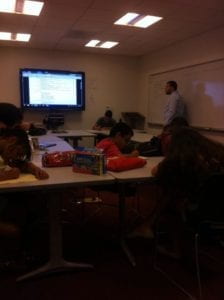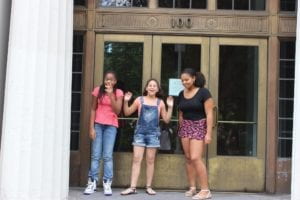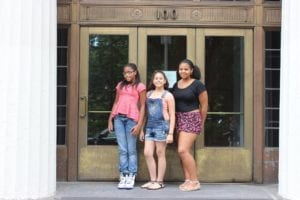Krystal McLeod
World Education Fellowship
New York, NY
Our ability to learn and our innate desire to be taught is what makes us human. Therefore, we can only assume that learning, like “life, liberty, and the pursuit of happiness,” is in essence an inalienable right. Our country recognizes that all groups, regardless of race, religion, and socioeconomic circumstance, should have the right to learn. Yet, many marginalized groups within its governance still are not equipped with tools to compete competitively against their peers in the classroom. The program I designed for this summer, “My” Right to Learn, has sought to resolve this.
We are different from other programs in that our curriculum is centered around R.E.S.P.E.C.T., a change management resource originated by Dr. Misek-Falkoff, a UN representative of World Education Fellowship). This allowed the students to co-create a learning environment in which they felt comfortable. We also had three rules for our four core classes: 1) there are no wrong answers, 2) keep an open mind, and 3) participation is key. For more information about our course curriculum, see the “My” Right to Learn website and Facebook page.
New York University undergraduate scholars Aarati Cohly (CAS 2016), Olufemi Olalye (CAS 2017), Nakita Mortimer (CAS 2016), and Robert Jackson (Tisch 2016), led our four courses:
“My” Rights centered on human rights in the global society, with “Stop & Frisk” being the main local topic of debate.
“My” Right to Truth examined the social and economic trends facing our communities. This became one of the students’ favorite classes! Touching on topics ranging from inadequate education to disregarded history, our students were encouraged to challenge their current understanding of the truth.
In “My” Right to Literacy, the students actively engaged in reading and discussing texts from both classic and modern literature. In addition, they were taught some of the fundamentals to effective writing and required to complete several writing assignments to increase their writing skills.
“My” Right to a College Education taught the students to organize and attain goals in college readiness.
Each student at the beginning of the program received a personal New York University “dream journal,” which proved to be a way for the “My” Right to Learn team to assess the students’ progress and determine ways to assist them in accomplishing their stated goals and dreams. During each class, the students were given prompts which they would expand upon in their dream journals. Over time, the students took pride in writing in their dream journals, with most pages full by the end of the summer session.
 All students also participated in bi-weekly “dream” meetings. These meetings were an opportunity for students to share their progress and their writing in their dream journals. This was one of the most touching parts of the program. Students would open up about the many things they felt were holding them back from accomplishing their dreams.
All students also participated in bi-weekly “dream” meetings. These meetings were an opportunity for students to share their progress and their writing in their dream journals. This was one of the most touching parts of the program. Students would open up about the many things they felt were holding them back from accomplishing their dreams.
What proved most powerful for me was that I could relate to many of their stories: experiences ranging from doubting parents to clear financial hardships. In these meetings, I was able to see first-hand the issues that continue to hurt the success of those from low socioeconomic situations. Through my experience with this program, I realized that when students have the support and mentorship needed to equip them with tools to accomplish their future goals and dreams, success is imminent.
This fellowship experience has truly changed my life! Thank you, Gallatin Global Human Rights Fellowship and World Education Fellowship, for allowing me to step foot into my dream!

